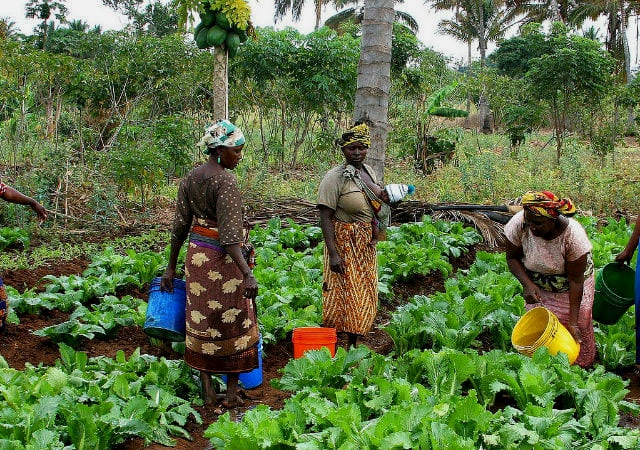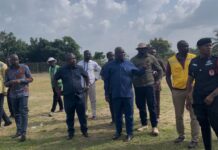As part of Alan Kwadwo Kyerematen’s vision to Transform Ghana into an export-based Economy, he has laid emphasis on the role of Agriculture in attaining that goal.
Ghana’s Agricultural sector is largely based on the production of raw materials for export. But the age-old method of production is back-bending, tedious, and unrewarding. The farms are smallholding, the tools used are outdated, and production levels are low.
It is this poor state of affairs that has been centuries old that Alan wants to change and turn Ghana into a modern agricultural-producing country with the capability of feeling the rest of the continent.
His vision of turning Ghana into an agro-processing hub on the continent is premised on establishing mechanized factories to turn raw farm produce into finished goods for consumption and export.
The means to attaining this vision is laid out in the New Agricultural Revolution (NAR) as part of Hon. Kyerematen’s Great Transformational Plan (GTP) aimed at the complete turnaround of Ghana’s economy.
Aspects of the NAR include:
i. Optimizing Value to Farmers by the establishment of Farmer-owned Large Scale Commercial Farms and Processing Facilities which will bring the full benefits of the agriculture value chain to farmers.
The agricultural sector is faced with financial challenges that do not allow farmers to engage in large-scale farming. Even if they do; they are faced with challenges such as post-harvest losses due to a lack of storage and processing facilities. Alan Kwadwo Kyerematen is therefore seeking to help the farmers maximize production and also to establish processing factories that will help to curtail the post-harvest losses to the barest minimum.
ii. Introducing Technology and Innovation into Agriculture, through Research & Development (R&D) in Agronomy, Mechanization, Irrigation, and Plantation Management.
This will build on the foundation laid by the Planting for Food and Jobs and Planting for Export and Rural Development (PERD) Programmes. Ghanaian farmers cannot be competitive without technology and innovation.
Farming in Ghana is seasonal in most parts of the country, hence food security is not guaranteed at all times. It is, therefore, the vision of Hon. Kyerematen to ensure that irrigation becomes a compulsory component of Ghana’s agricultural drive in order to make seasonal farming a thing of the past in the country.
iii. The establishment of Licensed Food Distribution and Marketing companies by the Private Sector throughout the country at the district level, to be supported by the Government. These companies will constitute a vital link between farmers and Market Queens in the urban and peri-urban areas.
It will be complemented by the introduction of a digitalized food distribution and marketing online platform that will connect producers to buyers and consumers.
One of the major priorities of Hon Alan Kwadwo Kyerematen is to ensure that; individuals get the needed support from the government to own companies that will employ the Youth and curtail the teaming unemployment rate as well as raise individual billionaires for the state.
iv. The strengthening of the Ghana Commodity Exchange as the marketplace for all actors in the Agricultural value chain.
The former Minister for Trade and Industry has already set the pace of creating a larger market to accommodate whatever his Great Transformation Plan (GTP) will have on Agriculture in terms of retailing of our produce.
AfCFTA has become a building block in providing a large market beyond the boundaries of Ghana that will help farmers to sell their produce and make a profit.
v. Deepening the current regime for lending and financing for the agricultural sector.
Hon. Kyerematen is of the view that the interest on loans in Ghana has always affected Ghanaian citizens.
High-interest rates have led to the collapse of many businesses, and the agricultural sector has not been spared. He is, therefore, going to ensure that the Bank of Ghana lowers its interest rate to suit producers in agriculture and agro-businesses.
vi. Enhancing the de-regulation of the cocoa sector by deepening private sector participation in the buying and marketing (including export) of cocoa.
vii. Mass Citizens’ participation in Agriculture by introducing an “Operation Own a Farm programme” for the Ghanaian citizenry in general. As part of making agriculture the centre of Ghana’s development; the operation own a farm programme, will be seriously implemented alongside the already existing Planting for food and Jobs.
This is the great plan of Alan Kyerematen to infuse new life into the agricultural sector to revamp it into the mainstay of Ghana’s economy and beyond.








